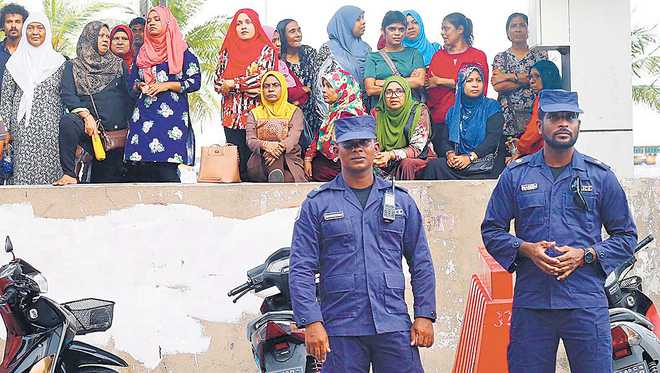
Maldivian police officers stand guard near the MDP (Maldives Democratic Party) opposition party headquarters after Maldives President Abdulla Yameen declared a state of emergency for 15 days, in Male, on February 6. Reuters
Tara Kartha
Formerly with National Security Council Secretariat
THE crisis in the Maldives is rapidly becoming a test for India's leadership role in South Asia and its status in the pecking order of nations. At one level, the statement from the Chinese foreign ministry, hinting that the "international community" should respect the sovereignty of the Maldives, was an implicit challenge to Delhi's unstated role in the region. Its reported statement a day later, recognising "common interests" of both India and China, served only to underline the fact that Beijing had an equal role in deciding the course of action in the troubled archipelago. At another level, was the conversation between the US President and Prime Minister Modi on issues that included the Maldivian situation. With such pressures, the "do something" lobby is active in pushing for a military intervention, while media is highlighting the disappointment of many to the Ministry of External Affair's seemingly lacklustre statement that it was "monitoring" the situation. In such a situation, there needs to be clarity on our capability to intervene, the immediate objectives of an intervention and its end results.
Our capability to intervene
First, in terms of a capability analysis, our military reach today is far better than in 1988, when planners of "Operation Cactus" had to rely on a tourist book supplied by the Ambassador for information on the airport runway. Today's intervention force has access to the best of satellite imagery, and will probably take less than the 15 hours it took for our paratroopers to reach the Maldives. The "enemy" was a terrorist force, said to have been backed by an earlier President. The lines between enemy and friend, right and wrong were clear, and, therefore, the mission was successful in its objectives. Order was restored and the terrorist force routed on land and sea. Today, that line is far less clear. Intervening in what are undoubtedly the internal affairs of a sovereign country is, generally, frowned upon. On the other hand, a significant rise in violence may make it impossible not to.
Immediate aims of intervention
Second, the immediate tasks of an intervention today are less clear. An intervening force would certainly have to fight the Maldivian National Defense Force (MNDF) which is solidly behind President Yameen. While the MNDF is a mere fraction of the Indian Armed forces, it is more than capable of simply blocking the runway with a few trucks, thus frustrating an air operation of the kind that was undertaken in 1988. The Maldivian naval elements are, similarly, hardly a threat to an overwhelmingly superior Indian navy. But a hostile landing either by sea or air, however successful, will be seen as a sign of a bully. Any defending force worth its salt will eventually try to either buy its own weapons, or far more likely, ask another power for help. China is only waiting in the wings for such an eventuality. Besides, long-term objectives will not be served by making an enemy of the MNDF.
End results of intervention
Third is the question of the eventual tasks following a successful military operation. The intervening force would have to undertake or oversee the tasks of governance while a political component would "persuade" the present head of government to go into exile. Thereafter, it would have to handhold the process for the next election through a transition government or a similar body. Given that the present unified opposition is anything but united, that's going to be a hard task. The Maldivian Democratic Party, former President Gayoom's own faction of the Progressive Party, the Aadhalat Party, and the Jamhooree party have little in common, apart from their hatred of the present leadership. A lot can happen in this intervening period. Certain foreign governments will undoubtedly pull all the plugs to engineer violent protests against the "occupying force". That could be the first step into a very messy bog, with potentially "Islamic" overtones.
Stability of Prez backed by India
Fourth is the question of stability of a new President backed so obviously by Indian military power. Proving that he can deliver an "independent" foreign policy would be difficult, especially since he would certainly be expected to roll back ruinous Chinese investments. This would immediately lead to accusations of a "sellout" from interested parties who benefited heavily from Chinese ingress. Beijing would relish India being shown as a regional hegemon.
These are the realistic costs of an aggressive intervention, quite unlike the Bangladesh operation which followed mass murder. The limitations of diplomacy were evident when GMR was pushed out in favour of Chinese companies. An option is a mix of the two, where diplomacy is backed by an implicit threat of intervention, to force the President to at least follow constitutional norms. This will serve the short-term objective of stabilising the situation. Long-term objectives, however, require long-term financial commitment. Regional power doesn't come cheaply, and a bailout of the Maldives is likely to be far less expensive than a military intervention, where the costs are far more than simply money.
Quite unlike Bangladesh operation
There are the realistic costs of an aggressive intervention, quite unlike the Bangladesh operation which followed mass murder. The limitations of diplomacy were evident when GMR was pushed out in favour of Chinese companies. An option is a mix of the two. This will serve the short-term objective of stabilising the situation.



























